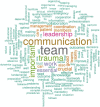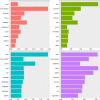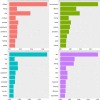Team dynamics in emergency surgery teams: results from a first international survey
- PMID: 34530891
- PMCID: PMC8443910
- DOI: 10.1186/s13017-021-00389-6
Team dynamics in emergency surgery teams: results from a first international survey
Erratum in
-
Correction to: Team dynamics in emergency surgery teams: results from a first international survey.World J Emerg Surg. 2021 Nov 1;16(1):55. doi: 10.1186/s13017-021-00397-6. World J Emerg Surg. 2021. PMID: 34724967 Free PMC article. No abstract available.
Abstract
Background: Emergency surgery represents a unique context. Trauma teams are often multidisciplinary and need to operate under extreme stress and time constraints, sometimes with no awareness of the trauma's causes or the patient's personal and clinical information. In this perspective, the dynamics of how trauma teams function is fundamental to ensuring the best performance and outcomes.
Methods: An online survey was conducted among the World Society of Emergency Surgery members in early 2021. 402 fully filled questionnaires on the topics of knowledge translation dynamics and tools, non-technical skills, and difficulties in teamwork were collected. Data were analyzed using the software R, and reported following the Checklist for Reporting Results of Internet E-Surveys (CHERRIES).
Results: Findings highlight how several surgeons are still unsure about the meaning and potential of knowledge translation and its mechanisms. Tools like training, clinical guidelines, and non-technical skills are recognized and used in clinical practice. Others, like patients' and stakeholders' engagement, are hardly implemented, despite their increasing importance in the modern healthcare scenario. Several difficulties in working as a team are described, including the lack of time, communication, training, trust, and ego.
Discussion: Scientific societies should take the lead in offering training and support about the abovementioned topics. Dedicated educational initiatives, practical cases and experiences, workshops and symposia may allow mitigating the difficulties highlighted by the survey's participants, boosting the performance of emergency teams. Additional investigation of the survey results and its characteristics may lead to more further specific suggestions and potential solutions.
Keywords: Knowledge translation; Non-technical skills; Team dynamics; Trauma leaders; Trauma teams.
© 2021. The Author(s).
Conflict of interest statement
The authors declare that they have no competing interests for this article.
Figures









References
-
- Dal Mas F, Garcia-Perez A, Sousa MJ, Lopes da Costa R, Cobianchi L. Knowledge translation in the healthcare sector. A structured literature review. Electron J Knowl Manag. 2020;18(3):198–211.
-
- Dal Mas F, Biancuzzi H, Massaro M, Miceli L. Adopting a knowledge translation approach in healthcare co-production. A case study. Manag Decis. 2020;58(9):1841–1862. doi: 10.1108/MD-10-2019-1444. - DOI
MeSH terms
LinkOut - more resources
Full Text Sources

